Introduction
Do Female Cockatiels Sing: Cockatiels are beloved pet birds known for their charming personalities and distinctive vocalizations. When it comes to these charismatic avian companions, many people wonder about their singing abilities. At the same time, it’s commonly recognized that male cockatiels are renowned for their musical tunes and whistling prowess. In this exploration, we will delve into the intriguing world of female cockatiel vocalizations to shed light on the extent of their singing abilities and the unique ways in which they communicate and express themselves.
Cockatiels sleep, scientifically known as Nymphicus hollandicus, are native to Australia and have been popular pets around the world for decades. Male cockatiels are celebrated for their captivating songs, which can include melodious tunes, cheerful whistles, and even mimicry of household sounds. Their vocal talents often take center stage in the world of pet bird enthusiasts. On the other hand, female cockatiels have a reputation for being somewhat less vocal than their male counterparts. However, this does not mean they are entirely mute or incapable of producing sounds.
Female cockatiels have their own unique ways of communicating and expressing themselves through chirps, whistles, and subtle vocalizations that may surprise those who assume they remain entirely silent. In this exploration, we will unravel the mysteries of female cockatiel vocalizations and the factors that influence their singing tendencies, from individual personalities to social interactions.
By the end, you’ll have a deeper understanding of the delightful world of female cockatiel sounds and how they contribute to the charming nature of these remarkable birds. Female cockatiels, although generally less prone to the elaborate songs that their male counterparts are known for, exhibit a wide range of vocal behaviors that are equally fascinating. One of the most common sounds produced by female cockatiels is the simple chirp, which they use to communicate with their owners, other birds, or even to express contentment or discomfort. Depending on the situation, these chirps can be soft and gentle or loud and energetic.
Another intriguing aspect of female cockatiel vocalizations is their ability to whistle. While male cockatiels are famous for their extensive repertoire of tunes and melodies, female cockatiels can also learn to whistle, albeit typically with a less complex range of notes. Some female cockatiels become proficient whistlers, while others may limit themselves to more straightforward, repetitive tunes. Social interactions and individual personalities play a significant role in shaping a female cockatiel’s vocal habits. In a group of cockatiels, whether all-female or mixed, these birds engage in conversations, including both males and females vocalizing. Female cockatiels may also use their vocalizations to establish dominance or attract a mate, although their displays are generally subtler compared to the striking courtship songs of males. In essence, female cockatiels may not be as famous for their singing as males, but they certainly contribute their own unique charm to the world of pet bird vocalizations.
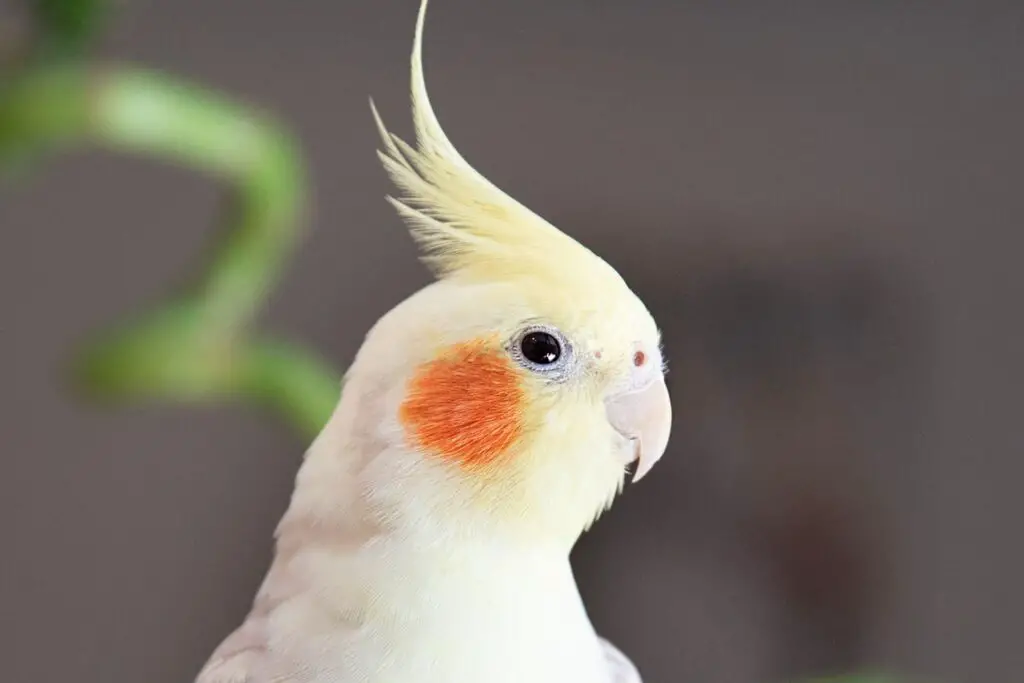
Are female cockatiels talkative?
Female cockatiel personality
The females will seek out favored people and make contact calls but they tend to be more particular to whose they answer. Female cockatiels, in general, do not imitate sounds or talk much; however, there may be a one- or two-word vocabulary. Female cockatiels mainly make one call.
Female cockatiels frequently engage in chirping and whistling, using these sounds to communicate with their owners and other birds. These chirps can vary in tone and intensity, from soft and soothing to more lively and energetic. While not as extensive as the vocal repertoire of males, some female cockatiels become adept whistlers and can mimic simple tunes.
Although less common than in males, some female cockatiels do exhibit mimicry skills. They might imitate household noises, such as the ringing of a telephone or the sound of a microwave, to the delight of their human companions. These imitations may not be as intricate or varied as those of parrots, but they showcase the bird’s ability to adapt and interact with its environment.
Female cockatiels are highly social birds. In a flock or a home with multiple birds, they engage in vocal conversations with their feathered companions, which can be quite lively and expressive. These exchanges are part of their natural instinct for social bonding and interaction.
Are male or female cockatiels more vocal?
Male
Male cockatiels are more likely than females to express themselves with this type of vocalization. They tend to be more vocal in general and seem to enjoy whistling. Female cockatiels are typically quieter and will oven hiss and screech more often than males.
Male cockatiels are famous for their exceptional singing abilities. They have a broader vocal range and can produce intricate melodies and songs that can be both charming and entertaining. They often learn to whistle tunes, mimic household sounds, and even imitate human speech to some extent.
Male cockatiels become particularly vocal during their courtship displays. They use their songs and calls to attract potential mates and establish their presence within a flock or household.
In a group of mixed-gender cockatiels or a multi-bird household, males often take the lead in vocalizing during social interactions. They engage in lively conversations with their fellow birds and may even try to engage their human caregivers in their songs.
Can cockatiels feel jealous?
Birds can get jealous and territorial, but with the right steps, it is possible to ease the tension and counteract your bird’s jealously. Small birds can often become jealous of another bird in the household, a family member, or even one of his toys!
Cockatiels are highly social birds that form strong attachments with their human caregivers and fellow birds. When they perceive a threat to their bond with you or a fellow bird, jealousy can arise. For example, if you spend more time with another pet, a new person, or even a different bird, your cockatiel might display signs of jealousy.
Jealousy in cockatiels can manifest in various behavioral signs. These may include increased vocalization (chirping, squawking, or screaming), aggressive behaviors like biting or territorial aggression towards their perceived rival, or even displays of depression or withdrawal.
Cockatiels may also exhibit jealousy when it comes to resources such as food, toys, or perches. They might become possessive and aggressive if they feel that another bird or pet is encroaching on what they consider their territory or possessions.
Jealous cockatiels often engage in attention-seeking behaviors. They may try to draw your attention away from the perceived rival by being particularly vocal, affectionate, or demanding of your time and affection.
Will 2 male cockatiels try to mate?
It is important to make sure the two cockatiels you pair up are of different sexes, as only a male and female can mate. This is because same-sex pairs will not produce eggs or offspring, regardless of how much they may bond with each other. Two males may engage in courtship behavior, but no eggs will be produced.
Cockatiels are naturally social birds that form close bonds with their flock members. These bonds can include behaviors like mutual preening, feeding each other, and regurgitating food, which are also observed during courtship and mating with the opposite sex.
Two male cockatiels may establish a territory within their cage or living space, and they might become protective of this area. This territorial behavior can sometimes be misinterpreted as nesting behavior.
Male cockatiels may engage in behaviors such as bowing, offering food, and regurgitating to their bonded companion, even if both birds are males. These actions can be expressions of affection and bonding rather than genuine attempts to reproduce.
Occasionally, if two male cockatiels have a particularly strong bond and are kept in close quarters, they might become territorial and aggressive, especially if they feel that their territory or bonded companion is being threatened.
Are female cockatiels more aggressive?
All agonistic behaviors were recorded, including the winner and loser of each interaction, along with allopreening and copulation behavior. Point samples were recorded every 60s to determine social spacing. Rates of aggression were significantly higher for male cockatiels than female cockatiels.
Just like humans, each cockatiel has its own unique personality. Some female cockatiels may be naturally more assertive or territorial, while others are more passive and gentle. The level of aggression can differ significantly among individual birds.
Female cockatiels, like males, can exhibit territorial behavior, especially in situations where they perceive a threat to their living space or resources. This can include defending their cage, perches, food, or toys.
In cases where female cockatiels are breeding or raising chicks, they may display protective aggression to safeguard their nest and offspring. This behavior is a natural response to ensure the survival of their young.
Aggression in female cockatiels can also be influenced by their social interactions with other birds, whether they are in a mixed-gender group or share their environment with other females. Competition for resources or hierarchy establishment can lead to confrontations.
Is it better to have a male or female bird?
A male might become more vocal and territorial. Nutritional needs can also differ between male and female birds during the breeding season. A female bird can lay eggs regardless of whether or not another bird is around. A female bird might need extra calcium in her diet, especially if she is an excessive egg layer.
In some bird species, males are known for being more vocal and outgoing. They may be more inclined to sing, whistle, or mimic sounds. However, individual personalities vary, and not all male birds are highly vocal.
Behavior and Personality
Female birds can also be affectionate and engaging. They may be less inclined to sing extensively but can form strong bonds with their owners. Their personalities can range from quiet and reserved to lively and interactive.
Vocalization
If you enjoy the sounds of singing and whistling, a male bird may be more appealing. Many male birds, such as canaries and cockatiels, are celebrated for their musical tunes. Female birds, while generally less vocal, can still produce delightful chirps, coos, and occasional mimicry. If you prefer a quieter environment, a female bird may be a better choice.
Mating Behavior
Some male birds may exhibit courting and mating behaviors even in the absence of a mate. This can include displays of affection, regurgitating food, and nest-building tendencies. Female birds, especially when they reach breeding age, may lay eggs even without a male partner. This can be managed with proper care and by providing a suitable environment.
Are cockatiels smarter than parrots?
To sum up, the available scientific evidence doesn’t give us an exact measurement of cockatiel intelligence but does show that it’s a very intelligent bird. Parrot species, in general, are among the most intelligent birds in the world, and cockatiels are among the smartest among them.
Problem-Solving Abilities
Parrots, particularly some species like African Grey Parrots and Amazons, are renowned for their problem-solving skills and advanced problem-solving abilities. They can manipulate objects, recognize shapes, and solve complex puzzles. Cockatiels also demonstrate problem-solving skills, albeit at a somewhat lower level in comparison to some parrot species.
Mimicry and Vocalization
A distinguishing feature of parrots, including African Grey Parrots, Eclectus Parrots, and certain Amazon species, is their remarkable ability to mimic human speech and a wide range of sounds. While cockatiels can also mimic sounds and some simple words or phrases, their vocal mimicry is generally less intricate than that of some parrots.
Learning and Memory
Both cockatiels and parrots exhibit impressive learning and memory abilities. They can quickly learn new behaviors, recognize their owners, and remember various cues and commands. Their capacity for learning is often influenced by the quality and consistency of training and socialization.
Do cockatiels feel love?
In a home environment, the cockatiels will love their owners the most and display their emotions through interaction and physical affection. They’ll chirp, whistle, stay in your proximity, talk to you and sometimes regurgitate the food you serve them to express their feelings.
Bonding and Attachment
Cockatiels are highly social birds that thrive on companionship. When they form a bond with their owner or a fellow bird, they often exhibit behaviors that can be interpreted as signs of love. These behaviors include cuddling, preening, and seeking physical closeness.
Vocalizations
Vocalization is a significant part of cockatiel communication, and the sounds they make can convey affection. Happy chirping, cooing, and softly whistling to their owner or bonded mate are all ways in which cockatiels express their contentment and affection.
Mutual Grooming
Mutual preening, where cockatiels groom each other’s feathers, is a common behavior in bonded pairs. This grooming is not just about hygiene but also serves as an expression of trust, care, and affection.
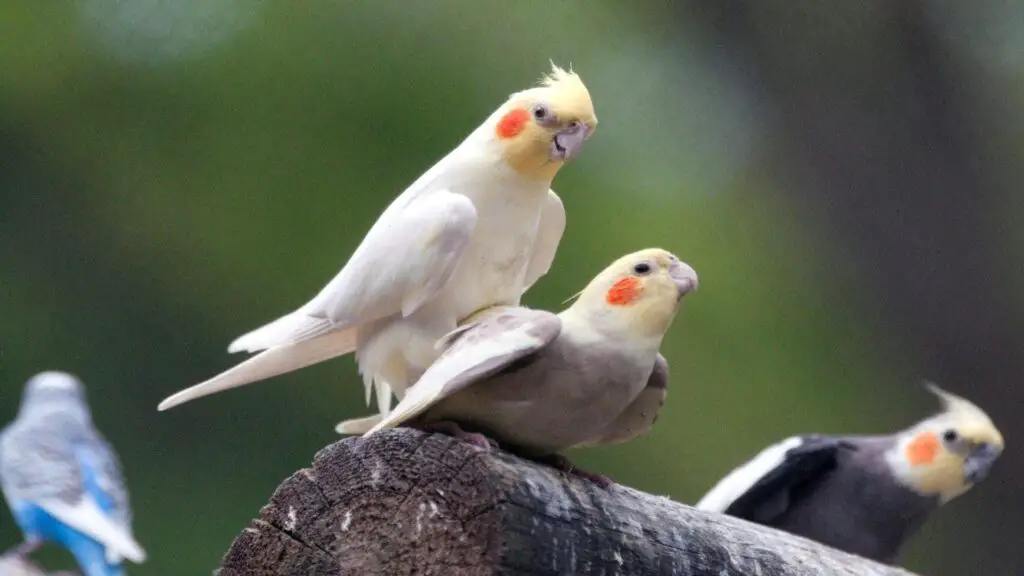
Conclusion
While it is true that female cockatiels are not as renowned for their singing abilities as their male counterparts, they are far from silent. Instead, female cockatiels possess a repertoire of vocalizations, including chirps and whistles, which they use to communicate, socialize, and express themselves. The vocal behaviors of female cockatiels are influenced by various factors, such as their personalities, social interactions, and environmental conditions. Some female cockatiels singing become proficient whistlers, showcasing their ability to adapt and learn simple tunes.
These sounds may serve various purposes, from bonding with their owners to conversing with fellow birds. Ultimately, female cockatiels contribute their unique charm to the avian world, demonstrating that the art of song is not limited to gender but is a testament to these beloved pets’ diverse and fascinating nature. Whether male or female, cockatiels enrich our lives with their vocal expressions, adding harmonious and endearing moments to the experience of sharing our homes with these remarkable feathered companions.
In their distinctive way, female cockatiels exemplify the beauty of avian communication. Their vocalizations may lack the elaborate melodies of male cockatiels, but they offer a nuanced and charming auditory experience that is no less enchanting. These subtle sounds reflect individual female cockatiels’ unique personalities and temperaments, making them endearing and captivating companions for bird enthusiasts. It’s important to remember that each male or female cockatiel has its own vocal talents and preferences. While some females may develop remarkable whistling abilities, others may focus on softer chirps and coos.

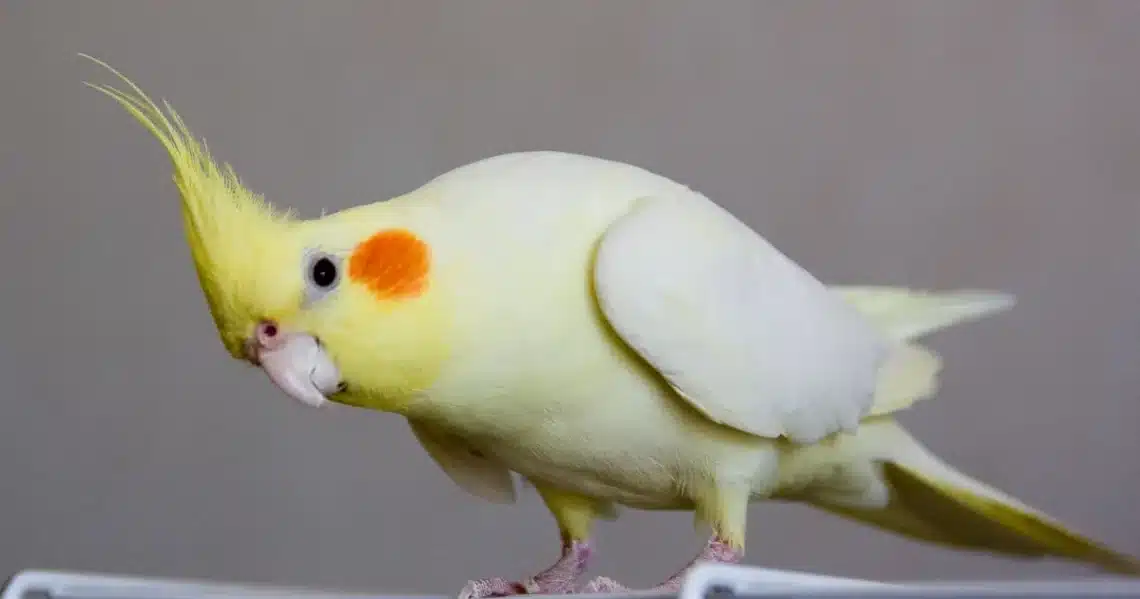
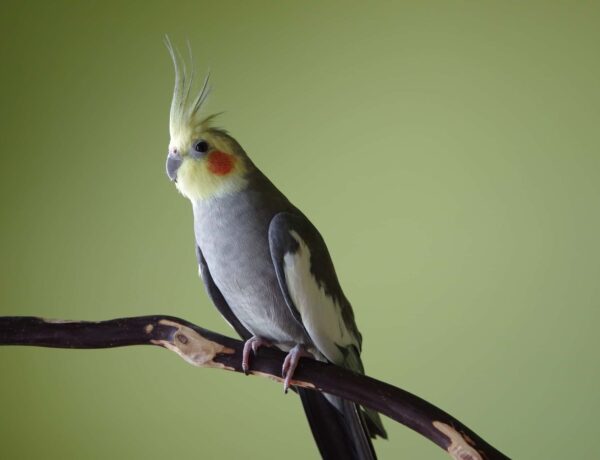
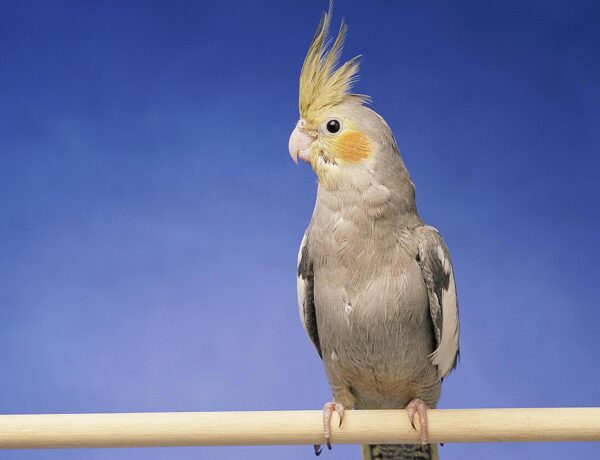
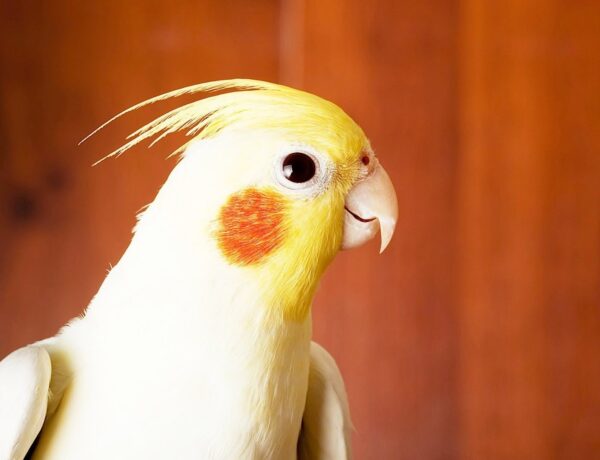
No Comments